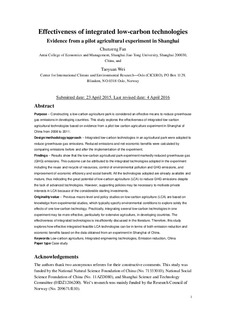| dc.contributor.author | Fan, Chunzeng | |
| dc.contributor.author | Wei, Taoyuan | |
| dc.date.accessioned | 2017-11-10T12:21:40Z | |
| dc.date.available | 2017-11-10T12:21:40Z | |
| dc.date.created | 2016-04-22T09:27:59Z | |
| dc.date.issued | 2016 | |
| dc.identifier.citation | International Journal of Climate Change Strategies and Management. 2016, 8 (5), 758-776. | nb_NO |
| dc.identifier.issn | 1756-8692 | |
| dc.identifier.uri | http://hdl.handle.net/11250/2465549 | |
| dc.description | This is an accepted manuscript of an article published by Emerald in International Journal of Climate Change Strategies and Management November 2016, available online: http://www.emeraldinsight.com/doi/abs/10.1108/IJCCSM-04-2015-0045 | nb_NO |
| dc.description.abstract | Purpose – Constructing a low-carbon agriculture park is considered an effective means to reduce greenhouse gas emissions in developing countries. This study explores the effectiveness of integrated low-carbon agricultural technologies based on evidence from a pilot low carbon agriculture experiment in Shanghai of China from 2008 to 2011. Design/methodology/approach – Integrated low-carbon technologies in an agricultural park were adopted to reduce greenhouse gas emissions. Reduced emissions and net economic benefits were calculated by comparing emissions before and after the implementation of the experiment. Findings – Results show that the low-carbon agricultural park experiment markedly reduced greenhouse gas (GHG) emissions. This outcome can be attributed to the integrated technologies adopted in the experiment including the reuse and recycle of resources, control of environmental pollution and GHG emissions, and improvement of economic efficiency and social benefit. All the technologies adopted are already available and mature, thus indicating the great potential of low-carbon agriculture (LCA) to reduce GHG emissions despite the lack of advanced technologies. However, supporting policies may be necessary to motivate private interests in LCA because of the considerable starting investments. Originality/value – Previous macro-level and policy studies on low-carbon agriculture (LCA) are based on knowledge from experimental studies, which typically specify environmental conditions to explore solely the effects of one low-carbon technology. Practically, integrating several low-carbon technologies in one experiment may be more effective, particularly for extensive agriculture, in developing countries. The effectiveness of integrated technologies is insufficiently discussed in the literature. Therefore, this study explores how effective integrated feasible LCA technologies can be in terms of both emission reduction and economic benefits based on the data obtained from an experiment in Shanghai of China. | nb_NO |
| dc.language.iso | eng | nb_NO |
| dc.title | Effectiveness of integrated low-carbon technologies: Evidence from a pilot agricultural experiment in Shanghai | nb_NO |
| dc.type | Journal article | nb_NO |
| dc.type | Peer reviewed | nb_NO |
| dc.description.version | submittedVersion | nb_NO |
| dc.source.pagenumber | 758-776 | nb_NO |
| dc.source.volume | 8 | nb_NO |
| dc.source.journal | International Journal of Climate Change Strategies and Management | nb_NO |
| dc.source.issue | 5 | nb_NO |
| dc.identifier.doi | 10.1108/IJCCSM-04-2015-0045 | |
| dc.identifier.cristin | 1351869 | |
| dc.relation.project | Norges forskningsråd: 209671 | nb_NO |
| cristin.unitcode | 7475,0,0,0 | |
| cristin.unitname | CICERO Senter for klimaforskning | |
| cristin.ispublished | true | |
| cristin.fulltext | preprint | |
| cristin.qualitycode | 1 | |
